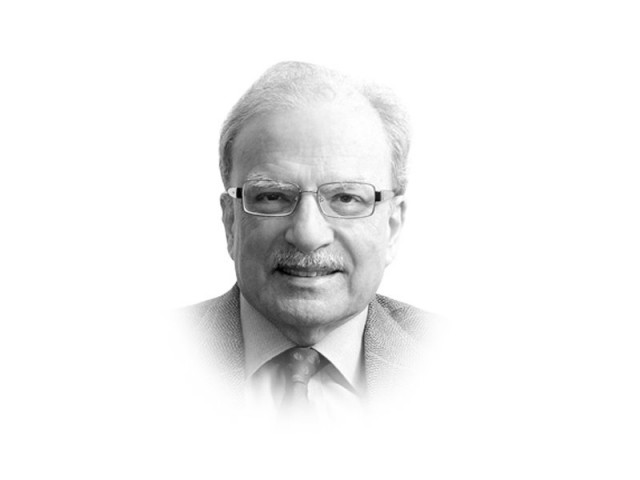Strains produced by globalisation
Globalisation as an economic philosophy came into vogue following the fall of the Soviet Union in 1991

The writer is a former caretaker finance minister and served as vice-president at the World Bank
A similarly powerful case was made by the Chicago economist Milton Friedman in favour of free markets, unconstrained by governments. In his book Free to Choose, published in 1980, a dozen years before the collapse of the Soviet Union, the doyen of conservative economic thinking, argued that “the world runs on individuals pursuing their separate interests.” Ronald Reagan was a Friedman disciple and the contribution he made to the collapse of the Soviet Union gave him an authoritative voice in policy circles. The president put it famously, “government is not the solution; government is the problem.” This fervent advocacy of free trade and the efficiency of unregulated markets led to the development of ‘The Washington Consensus’, so called because of the policy content in it was provided by economists working in the institutions located in the American capital. This line of thinking was directly responsible for the Great Recession of 2007-09.
The Great Recession occurred while China was enjoying the benefit of an alternative economic philosophy and a differently managed political system. The Chinese believed in an activist state. There was a precedence to this in the state that provided the ‘mai-bap’ functions in the colonial system run by the British in India. According to this interpretation, the state’s role was not only to supply all manner of basic services to the citizenry, it was also to protect domestic enterprises from excessive foreign competition. Those who believed in free trade came up with what came to be called the ‘infant industry argument’, according to which it was right to protect those enterprises that were in the early stage of development. The infant industry approach came to be embedded in the international trading system that evolved in the post-Second World War era.
The philosophical father of economic protectionism was Alexander Hamilton whose contribution to the development of the state in the United States was lauded by the popular Broadway musical Hamilton recently staged in New York’s Broadway theatre district. He was the founder of the American financial system whose followers included the Germans, the Japanese and, indirectly, the Chinese.
While the benefits from the process of globalisation became apparent, especially after the establishment in 1995 of the World Trade Organisation, it took time for those who were adversely affected by it to rebel against its basic principles. Donald Trump in the United States and various rightist movements in Europe took sharp positions against those they disparaged as ‘globalists’. They took up the case of those who had seen serious reductions in their economic wellbeing. Jobs were lost because a large number of Western enterprises that needed low-skilled and low-wage labour moved to the countries where such workers were available in abundance.
Donald Trump, the new and unpredictable political leader of the United States, took a dim view of the impact of globalisation on large segments of his country’s population. This was a much narrower interpretation of globalisation; Trump turned ‘globalists’ into a term of abuse. Denouncing and rejecting the “false song of globalism” during the long campaign for the US presidency, Trump, the new American leader, moved quickly. On his first third full day in office, he cancelled the Trans-Pacific Partnership, a regional trade deal with Japan and 10 other Pacific-Rim countries. This was an American-inspired initiative and as seen by Barack Obama, Trump’s predecessor, it would have brought tremendous benefits to the American economy. Trade among these 12 nations would have followed the American system of corporate governance.
Trump then went on to denounce Canada, Germany and South Africa for exporting more to the United States than they imported from his country.
Not well-versed in economics, he became obsessed with trade deficits. Whichever world leader he met and whichever country he visited, he made abundantly clear that his aim was to achieve a balance in trade between his nation and with other countries. If large trade surpluses other countries had with the United States could not be quickly eliminated, he wanted them to be put to use to benefit his country. For instance, while suggesting a new approach to solve the long-running American-led war in Afghanistan, he proposed that New Delhi should use its large surplus with the United States to aid Kabul.
Trump opposed all multilateral trade agreements; those that had already been negotiated and those that were in the works. He declared his unhappiness with the terms president Bill Clinton had accepted in negotiating the North America Free Trade Area involving Canada, Mexico and the United States. Trump had been persuaded by his trade advisers that large trade deficits were bad for his country’s economy. In the article in this space next week, I will discuss how China has now become the leading exponent of globalisation.
Published in The Express Tribune, February 19th, 2018.
Like Opinion & Editorial on Facebook, follow @ETOpEd on Twitter to receive all updates on all our daily pieces.
















COMMENTS
Comments are moderated and generally will be posted if they are on-topic and not abusive.
For more information, please see our Comments FAQ